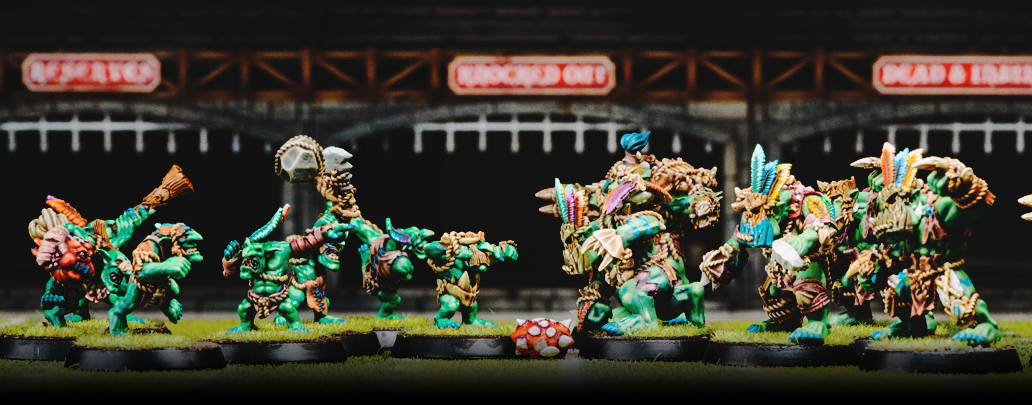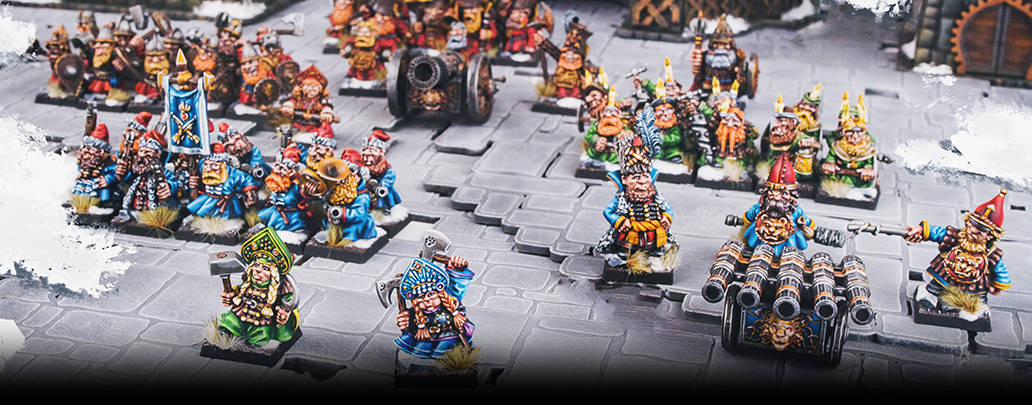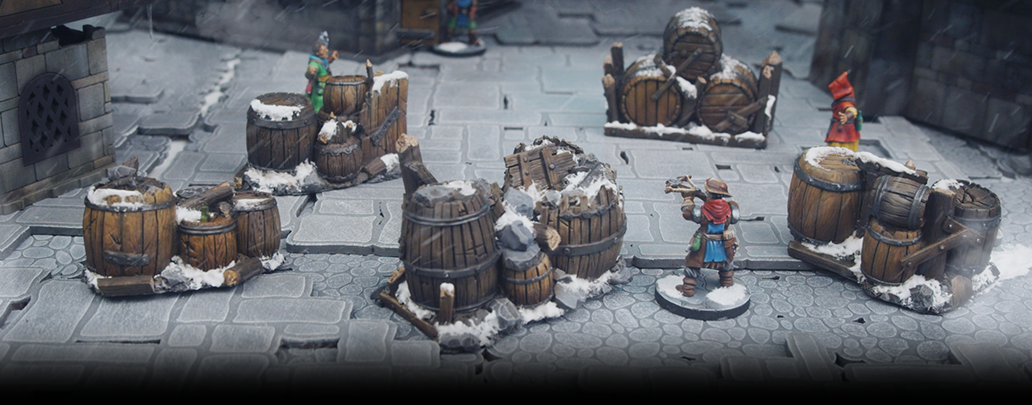Miniature tabletop - what is it and how to play?

The term “miniature tabletop” consists of words understandable to everyone. But once we put these two words together, we get a name of an activity that might not be so obvious. Among thousands of other hobbies, sports, and forms of entertainment, plenty of people have never heard about something like that. As we at Kromlech (almost literally) live and breathe tabletop miniature gaming, let us guide you through the basics of this fascinating world. Who knows? Maybe you’ll be the next to step into this vast, engaging hobby.
What is tabletop miniature gaming and how does it differ from traditional wargaming?
The easiest way to describe tabletop miniature gaming is to give an example. And there is no better example in this category than Warhammer 40k - one of the most popular games of this kind - created by Games Workshop.
The people who enjoy miniature tabletop usually call themselves “players” or simply “fans.” Traditionally, when they dive into this hobby, they find one specific game that suits them the most and focuses on it. Of course, many players try to be more versatile - they change their preferred games from time to time, try some new systems, or even don’t focus on anyone, trying to play in every miniature tabletop game.

Wargames can take many forms - it’s not always about big battles on the battlefields. Sometimes the fight might happen on a… playing court
Once we established who plays miniature tabletop games, now is the time to look closely at precisely what this activity is. You may already know about some traditional wargames. These are most commonly associated with historical themes. The main goal of such games is to reconstruct a specific battle from our history on the gaming table, using some models on a strict scale. It’s like a mix of modeling and strategy.
Although traditional, historical wargames are a fascinating, engaging activity, they may be found by some players (especially new ones) as too complicated. That’s because these games are relatively slow-paced and dedicated to enthusiasts of both history and wargames. If you’re interested in similar activities but do not necessarily feel you could handle such specialized requirements, you can always give a chance to tabletop miniature gaming.
Both mentioned activities look similar, and on a certain level, they are, but there are some significant differences. These differences may refer to rules and gameplay but aren’t limited to them. Overall, tabletop miniature gaming is more “open” in the meaning of scale allowance, customization of your army, and genre. Yes - the significant difference between this type of wargaming and the historical one is that miniature tabletop operates (mainly) on fictional universes - both fantasy and science fiction - where you don’t need to be so precise when assembling and painting your troops or building an army. Of course, some rules still exist, but even with them, tabletop miniature gaming guarantees a healthy portion of freedom.
Some might say that the above features don’t really suit them, and they still prefer traditional wargaming. And that’s completely fine - you should pick a solution that you’ll truly enjoy and don’t bother when someone persuades you that “another thing is better.” That’s not the point at all! As tabletop miniature gaming enjoyers, we just want to show you how exciting this proposition for spending time with friends and relatives can be. If - after that (quite long, we confess) introduction - you’re interested in diving into the miniature tabletop universe, proceed with reading!
What are the benefits of using tabletop miniatures as opposed to other methods of gaming?
As we stated earlier, tabletop gaming offers a rational dose of freedom. It might be best visible when we look specifically at the miniatures. In games such as (already mentioned) Warhammer 40k, there is a term such as “heroic scale.” It means that although the models are on a specific scale, they don’t need to be as realistic as in historical games. Here, it’s allowed to have figures with arms slightly too big compared to their heads and so on. In some way, it’s because of the unnatural clime in which the settings of these games lay. After all, when you have a universe in which Orcs, Daemons, and other horrors exist, it’s highly probable that not every other rule from our world will also work there.

These Dwarfs are a good representation of not-entirely proportional models that still create an imposing and entertaining army
Sticking up to the point and remaining closer to the ground. The crucial benefit of using tabletop miniatures is that they offer a vast cafeteria of converting possibilities. Among many different games and companies that provide bits and accessories for such games, you - as a player - have many other options for building and customizing your force. You can choose an economic path, trying to save as much money as possible, or - not bothered by prices - afford and then finish an unimaginably unique, customized, and numerous army. You can also balance between those two ways, treating the conversion process as a healthy addition to the hobby.
No matter which path is destined for you, it’s always good to have a choice (the vaster, the better). You can even choose how you get the miniatures and the bits you would like to convert them. For example, look at our Kromlech 3D Workshop offer - you don’t necessarily need to buy models cast in plastic, resin, or metal. You can afford a 3D printable file and print it in the desired amount by yourself.
And remember that converting your miniatures and even building them from different parts isn’t anything wrong in tabletop miniature gaming. As long as you rely on your common sense and stick to similar sizes of miniatures (for example, remain in either 28 mm scale or 32 mm), everything should be great. Even if some of your models won’t look much realistic in the end.
How do you get started in miniature tabletop gaming if you're new to it?
The best way to get started in miniature tabletop gaming is to find a game you would like to play. Because hundreds of different systems exist, there is a good chance that you’ll find something appealing. Whether it’ll be a game based on a universe known previously from movies, books, and comic books (like “Middle-earth: Strategy Battle Game,” “Star Wars: Legion” or “Masters of the Universe: Battleground”), or universe explicitly created for a particular game - building whole background through other media because of it (for example, “Frostgrave,” “Kings of War,” or “Oathmark”). By picking a game, you’ll have a clear situation of what you want to accomplish:
-
Which faction to collect.
-
What kind of army to build.
-
Which tournaments or events to look after.
Trying some alternative approaches might help you choose your first system (but not the last one, as when you dive into this hobby, you may find more and more of them attractive). For example, if you enjoy this hobby’s modeling and painting side the most, you can gather several figures (even from different systems - it doesn’t matter at this point) and prepare them like you intended to play them. By working with miniatures, you’ll have the possibility to get to know them really well. That is when you can decide which way you prefer - whether to play a game in a 28 mm scale or maybe the one in 32 mm. It may happen that you’ll be much more amazed by the look of the figures - their quality and design - than the whole background story. And that’s ok too!
Finally, you can also begin your adventure with - surprisingly - a book. If you’re more of a player than an artist, start by reading some rulebooks because even if one game is set in one of your favorite universes, it may not fit you in the matter of gameplay at all. Still, it might not be a problem for you, but if it is, you better look for something satisfying for you to play. After all, it matters too.
What are some popular miniature games that people play today?
Like everything, there is a possibility of pointing out the most popular miniature games people play today. As we mentioned earlier, systems created by Games Workshop are probably best known and, in effect, most popular - played by the most significant number of people in this hobby. Whether it’s Warhammer 40k, Horus Heresy, Age of Sigmar, or Middle-earth, there is a good chance that their players are more numerous than those who play in other systems. Of course, it’s always debatable, as many gamers play in several systems, and sometimes even for them, it’s hard to pick one as their favorite.
Nonetheless, it’s good to remember that if you find one game interesting, it shouldn’t be a problem for you whether it’s played by many or not. As long as you can find some friends or relatives (or both) to play with, you’ll probably never feel that this particular game isn’t popular. If you like a specific system, it means that it’s worth playing in.
What materials and tools do you need to start playing miniature tabletop games yourself?
And now comes the time for some basics. Even if you already know what kind of tabletop miniature game you wish to play, you’ll still need some stuff to begin with - no matter if you’re more focused on this hobby’s modeling or playing side.

Frostgrave is an excellent example of a game set in a specific setting. Playing it, you need to keep both your miniatures and terrain in “frosty” clime
As for the modeling and painting enjoyers, it’s clear that you won’t be able to create what you wish to make without suitable tools. That is why at our webstore, you can browse a vast cafeteria of modeling and basing products. Initially, it’s probably reasonable that you should focus on the most significant things like glue, knives, or bases. These are the essentials, without which you won’t be able to assemble (and later paint) your models.
But even if you pass through the modeling aspect of this glorious hobby, then you may need to prepare for the essence - gaming. Although playing isn’t obligatory, it’s hard to pretend it’s not fundamental to this hobby simultaneously. Even the name itself indicates it. And if you don’t feel much of a player, remember that it’s always good to try it. When you’re already invested in tabletop miniature gaming (because of modeling stuff, for example), finding out how enjoyable it is might be surprising even for you.
Gaming accessories are what you’ll need to play. Maybe not in such a professional form because you can always replace them with more economical ones, but you’ll need them nonetheless. There are different types of these accessories - each has its purpose. For example, battle rulers are required for measuring stuff, battle dice for rolls determining whether the shot reaches its mark, and tokens, markers, templates, and similar are for marking some crucial points or even whole areas on the battlefield.
Remember that you can always use any dice you have, measure distances with a standard measurer, and mark anything on your battlefield with coins and similar stuff. The accessories in our offer are for making your games “easier” and “faster.” You probably won’t notice that in the beginning, but once you start to play more significant battles using many different models, you’ll see that such things as battle rulers can be really helpful.
Finally - as for the closure of this article - there is one more thing to mention. In time, when you’ll dive deeper and deeper into this fantastic hobby, you might find yourself in need of some terrain, scenery, etc. It’s something that isn’t necessary from the start, but it’s good to think about it later. When that time comes, check our Tabletop Scenics range of products - you’ll find many different terrain features there.
And that is pretty much it if the subject is an introduction to tabletop miniature games. We hope that you found this article helpful. Be sure to look for other texts, guides, and manuals, if you would like to learn more about this hobby. You’ll find them here, but you can also look for more in other sources, as it’s always good to compare and exchange your experiences. With such a wide range of possible games, companies, etc., we’re more than sure that you’ll find something suitable. And for now, all we can do is wish you many exciting battles on the table!




